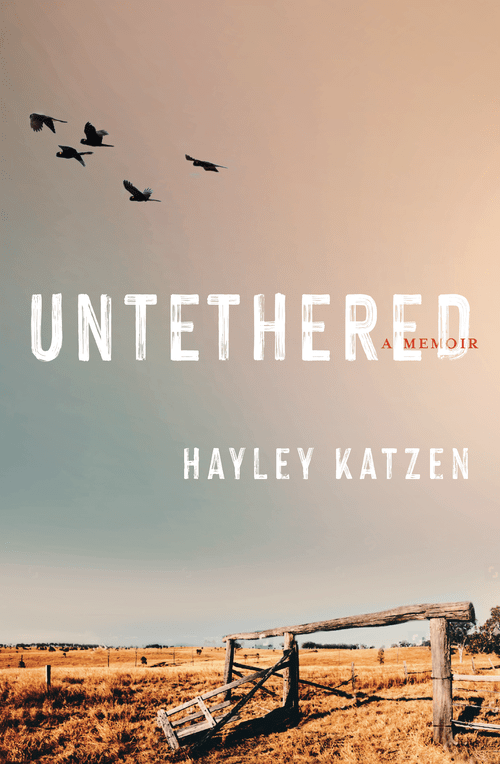When urban academic Hayley Katzen moves to a remote Australian cattle property to live with her farmer girlfriend, she hopes, at last, to find home.
But this is no happy-ever-after tree change. Lecture halls, law reform and the arts are replaced with castrating calves, shovelling manure, fire-fighting and anti-gas blockades. In a place that attracts people who live by their own rules, Hayley must confront her limitations and preconceptions to forge her own identity.
Set in the unpredictable beauty of the Australian landscape, and told with Hayley Katzen’s compelling candour and rigour, Untethered charts one migrant’s search for home. Part love story and part off-the-grid adventure, Untethered is a powerful reminder that home can be found in many forms – in love, in family and friends, in ideologies and political movements, in landscapes and communities, and ultimately, in ourselves.
The bubble of blissful isolation
Back in 1998, during our first romantic year, I was rarely alone on the farm. The first time, I sat beneath the passionfruit vine, struck by the silence and beauty but also by the depth of the aloneness in this middle of nowhere place. I imagined myself disappearing, becoming irrelevant. I might be completely smitten with Jen but no way would I choose such isolated living over my creative and diverse community at the coast. The years ticked by. I lived and worked in town, two and a half hours from the farm; Jen continued to live here. Our fortnightly long weekends were indulgent and delicious.
Fast forward a decade to a time when I spent most of my days alone at my desk overlooking the vegie garden and down the rutted driveway. Early evening I’d hear the horse’s hooves and look out to see Jen heading home. Although there’s a small local community, I’d not made ‘friends’ in my usual way. This beautiful connection with Jen, even my trips to visit my coastal friends, didn’t satisfy my appetite for connection or assuage my sense of invisibility.
With no mobile phone reception, dial-up internet, mail only three times a week and rarely any unannounced visitors, I’d sometimes turn on the radio just to hear another voice. The isolation I’d so feared had become a defining feature of my life. I railed against it, feared my city friends had bored of me and that I’d become a character in a Jane Austen novel, waiting for my partner to return home. I longed for that merry-go-round of life out there.
And I didn’t want to leave Jen. The push-and-pull. If only the choice would be made for me by an external force – like a job or medical reasons. If only I was stronger, fitter, more self-sufficient. Isolated living seemed to highlight all my limitations. My failure to love the freedom and beauty of this place and life, to fully inhabit this wondrous relationship became the stick with which I beat myself. I could see no way out, no end.
Fast forward another decade to this time of covid quarantine and I’m grateful for this isolated living and the way in which this place and its people have shaped me so that I now appreciate aloneness. I am able to be where I am, rather than longing for where I’m not.
What’s more, after last year – ovarian cancer, drought, bushfire and a beloved friend’s death – I now have the energy and space to work and knit myself back together. The February flood settled the soot and dust. Around us the bush is recovering, the paddocks thriving, wild zinnias swarm across the garden and we’ve eaten our first micro greens from Jen’s garden. I have access to iMessages and What’s Apps, and there are calls from friends whose lives are now less peopled too. I have never felt less isolated.
Here in this temporary bubble, I read poignant reflections on fear of aloneness, frightening accounts of people who are unsafe. I read tips for mental health, about technology to help one connect, and ‘social-distancing burnout’. Everywhere are acknowledgments of our innate need for connection, everyday opportunities are offered to connect virtually. And yet, now, after all these years, I am happy right here in this moment, breathing in the stillness and vastness, grateful to hear only the whirr of my thoughts or voice, Jen’s comments or laughter, or today’s chosen soundtrack.
There is no decision to make, nothing I need to do about this isolation. At some point the doors will swing open, the streets will fill and community will again take place face to face.
